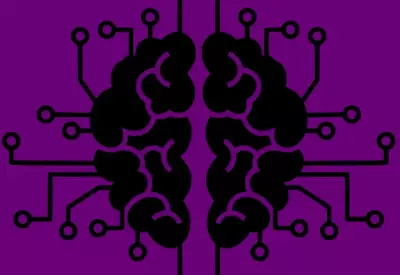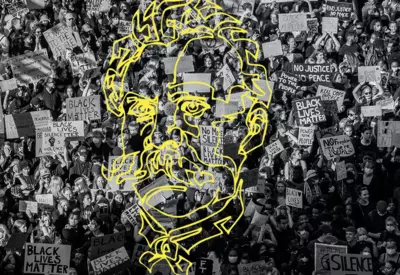From populist politics to debates over vaccines and gender, ours is an age of polarisation. How can we debate productively in cases of deep disagreement? Wittgenstein’s account of balancing certainty about the rightness of our beliefs with intellectual humility provides the key, argues Drew Douglas Johnson. We can achieve this balance by recognising that our core certainties are rationally ungrounded, and yet are no less legitimate for this groundlessness.
We live in a period where there is greater access to information and ease of communication than ever. Yet society today is marked not by consensus, but by increasingly extreme and harmful polarization. For example, entrenched disagreement on the very existence of covid-19 threatened the ability of governments to act swiftly to address the global pandemic.
How should we navigate deep disagreements? On the one hand, it is important to include a plurality of worldviews in democratic deliberation. This suggests a form of epistemic relativism, the idea that there can be multiple epistemic frameworks, and that these frameworks cannot be ranked from an epistemically neutral position. An attractive feature of relativism is that it supports intellectual humility—a virtue in short supply lately. On the other hand, epistemic relativism might seem to have a chilling effect on meaningful collective deliberation. After all, what would be the point of engaging in disagreement if both views are equally rationally legitimate?
We find a surprising source of guidance on questions of deep disagreement, relativism and humility in Wittgenstein’s On Certainty (1969). Wittgenstein himself was no paragon of tolerance and humility in resolving disagreements (as illustrated by the infamous “poker incident”). Yet On Certainty’s emphasis on the importance of recognizing the groundlessness of our believing can help us navigate the tensions between certainty and humility. By cultivating the intellectual humility that Wittgenstein describes, we can learn how to debate productively with those we deeply disagree with.
Wittgenstein on the groundlessness of believing
In On Certainty, Wittgenstein engages with G. E. Moore’s famous response to radical skepticism. The basic skeptical problem is well-illustrated by films such as The Matrix or The Truman Show. How can I know that I am currently drinking coffee, if I can’t rule out the possibility that I actually exist in the Matrix, or that I am a brain-in-a-vat being stimulated by electrical impulses to have hallucinatory experiences?
Moore flips the skeptical argument on its head. He first holds out his hand and says, “Here is one hand.” The argument continues: given that Moore does know that he has hands, it follows that he cannot be a (handless) brain-in-a-vat, plugged into some matrix-type device. The very fact of Moore’s knowledge that he has hands provides rational grounds to reject skeptical scenarios Wittgenstein criticizes Moore’s reply to the skeptic—not to reinstate the skeptical problem, but to dissolve it in a different way. Wittgenstein argues that Moore cannot properly claim to know that he has hands. This is because claims to knowledge imply that one has access to good grounds for that knowledge—grounds which are more certain than that for which they are a ground. The problem is that when Moore claims to know that he has hands, he lacks any grounds that are more certain than the claim that he has hands itself.
 SUGGESTED READING
Escaping the cult of rationality
By Ben Burgis
SUGGESTED READING
Escaping the cult of rationality
By Ben Burgis
Should Moore justify the claim that he has hands on the basis of his visual perception of his hands? As Wittgenstein explains, “suppose a blind man were to ask me, ‘have you got two hands?’ I should not make sure by looking. If I were to have any doubt of it, then I don’t know why I should trust my eyes.” (OC §125). If you really doubted whether you have hands, then it seems you couldn’t trust your eyesight either, because that is no more certain than your belief that you have hands.
The insight here is that our most certain commitments—such as Moore’s belief that he has hands or my belief that my eyes are working well—simultaneously support ordinary knowledge while being themselves rationally ungrounded. These commitments constrain what kinds of doubts we can raise: “the questions that we raise and our doubts depend on the fact that some propositions are exempt from doubt, are as it were like hinges on which those turn” (OC §341). Passages such as these have inspired “hinge epistemology,” following Wittgenstein’s idea that our rational knowledge, as well as our practices of debating, justifying, and raising doubts, all depend on the fact that some commitments are held fixed—are hinges.
Wittgenstein thus identifies a surprising limitation on our ability to justify our knowledge claims. Our core certainties or hinges have to be rationally groundless, but they are nevertheless legitimate to hold. Just as there are no more certain grounds that could be used to support a core certainty, so too there are no more certain grounds that could be used to call one into doubt. As Wittgenstein puts it, “The difficulty is to realize the groundlessness of our believing” (OC §166).
___
The rational groundlessness of belief is inescapable
___
Wittgenstein’s relativism
Traditional philosophical responses to skepticism center an objective, universal conception of certainty. For instance, Descartes’ famous cogito ergo sum (“I think, therefore I am”) was supposed to provide an indubitable universal starting point for the rest of our knowledge. The idea is that this is a core certainty that we all share, no matter what perspective on the world we have.
Wittgenstein provides an antidote to this way of thinking. The sheer range of examples of core certainties that he discusses in On Certainty suggests that what can count as a core certainty might change with context. Some of the examples Wittgenstein uses include the claims that,
“If someone’s arm is cut off it will not grow again” (§274)
“Motor cars don’t grow out of the earth” (§279)
“I am now living in England” (§421)
“The water in the kettle on the gas-flame will not freeze but boil” (§613)
and, most famously, the Moorean claim that one has hands. Wittgenstein also explicitly considers the possibility of communities with radically different core certainties to his own; for instance, a community that believes they travel to the moon in their sleep (this is how they interpret dreams) (§106).
 SUGGESTED READING
Wittgenstein vs Wittgenstein
By Lee Braver
SUGGESTED READING
Wittgenstein vs Wittgenstein
By Lee Braver
This diversity in core certainties suggests a form of epistemic relativism. Since core certainties provide the framework for deliberating rationally about what to believe, radical divergence in sets of core certainties between communities will constitute fundamental differences in epistemic perspective. But there is also no “neutral” framework-free perspective from which to rank such perspectives (we can only start from our own “language-game”). For rational evaluation to take place at all, some “hinges” must already be taken for granted.
Relativism is sometimes criticized for failing to allow for the critical interrogation of worldviews. What would be the point of arguing with a committed covid-19 denialist, if such a view is equally valid as others on which covid-19 is a real and deadly virus?
This criticism betrays a misunderstanding, however. The core commitments of epistemic relativism are:
(i) that there are multiple epistemic perspectives, or frames for interpreting evidence and reasons
and
(ii) that there is no perspective-transcendent way of evaluating whether a given epistemic perspective is better than another. We cannot inhabit a “view from nowhere” to compare epistemic perspectives from some supposedly neutral stance.
This does not mean, however, that critical evaluation of epistemic perspectives is not possible. It just means that when we critically evaluate an epistemic perspective, we always already do so from within an epistemic perspective.
Intellectual humility
One of the advantages of epistemic relativism is that it is supposed to support intellectual humility, in the recognition that one’s perspective is just one among many. But what is intellectual humility, and how can it be compatible with holding core certainties that are resistant to doubt?
Intellectual humility might be said to consist in owning one’s cognitive limitations—being aware of and acting appropriately given those limitations. The difficulty is to realize the groundlessness of our believing, Wittgenstein tells us. When one becomes aware that one’s most firm certainties are themselves rationally ungrounded, one begins to manifest a form of intellectual humility. This does not mean that one should abandon those commitments, nor seek a firm foundation for them. The rational groundlessness of belief is inescapable. What we can do is learn to live with this groundlessness responsibly. This means working to gain some self-knowledge about where our own groundless certainties lie, and to remain open-minded in our engagements with those who have different core certainties.
___
In some passages, he likens these certainties to the bed of a river: some thoughts shift easily, while others are like the river-bed, changing only slowly and imperceptibly over time
___
How to navigate disagreement: the Wittgensteinian approach
Because core certainties are immune to doubt within an epistemic perspective, attempts to challenge them directly by providing counterevidence are unlikely to be effective. This explains the persistence of deep disagreement. This idea is supported by recent work on the “psychological immune system,” which suggests that beliefs are resistant to change in response to counterevidence when changing those beliefs threatens the individual’s sense of self.
Since core certainties are held in place by systems of belief inherited from broader communities and educational systems, we should expect deep disagreements to arise where there are rifts across such communities and education systems. Given this rather pessimistic Wittgensteinian view of deep disagreement, what prospects are there for navigating deep disagreement effectively? Can our core certainties change? If so, how?
According to Wittgenstein, change in core certainties is indeed possible. In some passages, he likens these certainties to the bed of a river: some thoughts shift easily, while others are like the river-bed, changing only slowly and imperceptibly over time (§§96-100). Given that our core certainties are influenced by the communities we inhabit, an important way to shift core certainties is by broadening those communities. Choosing one’s friends wisely then is important not just to cultivating a good character; it is also important to cultivating good beliefs. If I want to move beyond the limitations of my core certainties, I need to venture outside of my epistemic comfort zones.
 SUGGESTED READING
Nietzsche's unwitting case for equality
By Donovan Miyasaki
SUGGESTED READING
Nietzsche's unwitting case for equality
By Donovan Miyasaki
Here are some of the lessons we can draw from Wittgenstein and put into practice. Suppose that Judith and Richard disagree about whether abortion is morally wrong. If the belief that abortion is morally wrong is a core certainty for Richard, but not for Judith, then this is a case of direct deep disagreement. But suppose that Richard’s belief in the wrongness of abortion is not itself a core certainty, but is instead supported by some underlying core certainty of his—by his religious core certainties, say. Then his disagreement with Judith would be a case of indirect deep disagreement.
In the case of indirect deep disagreement, a rational resolution is possible if interlocutors can discover a way to debate the contested claim without calling into doubt the underlying core certainty. For instance, Judith might argue that abortion can still be morally permissible even when Richard’s underlying religious commitment is granted. This in fact seems to be the argumentative strategy taken in Judith Jarvis Thomson’s celebrated article “A Defense of Abortion” (1971). One way to exercise intellectual humility in these exchanges is to be honest about where one’s core certainties lie, and to set those certainties as “out-of-bounds” for the purposes of debate.
In the case of direct deep disagreement, a different strategy is required. In thinking about how to shift a core certainty, we need to bear in mind how core certainties are informed by our educational and social environments. So a first step towards shifting someone’s core certainty would be to simply include them in communities that operate with different beliefs, without trying to debate points of disagreement at first. At the same time, the person will need to have some degree of open-mindedness. The relevant kind of open-mindedness here is outward-looking: it is a practice of other-directed attention, of being curious and willing to learn about the perspectives of others. It is this kind of curiosity that we can learn to cultivate from Wittgenstein, however imperfectly he practiced it himself.














Join the conversation